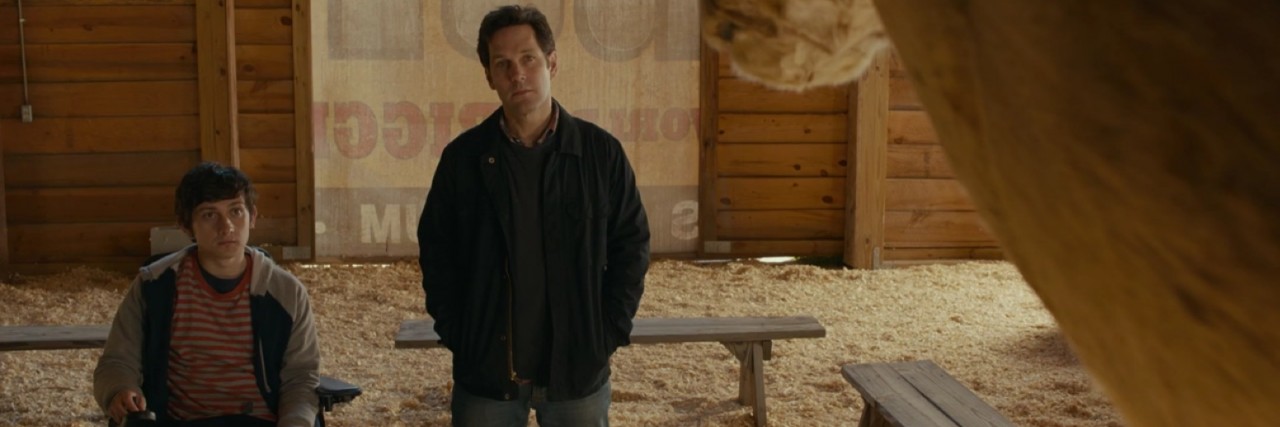Netflix's New Movie Features a Boy With Muscular Dystrophy Played by an Able-Bodied Actor
There’s a problem with disability representation in Hollywood.
From Ansel Elgort playing a cancer patient and amputee in “The Fault in our Stars,” to Eddie Redmayne playing Stephen Hawking in “The Theory of Everything,” and Sam Claflin playing a quadriplegic in “Me Before You,” Hollywood has been facing an increasing amount of criticism for casting an able-bodied actors in disabled roles.
Now, “The Fundamentals of Caring,” a new movie based on a book by Jonathan Evision, joins the fold by casting an able-bodied actor to play a character with muscular dystrophy.
The movie, which premieres on Netflix on June 24, tells the story of Ben (Paul Rudd), a caregiver-in-training, and Trevor (Craig Roberts), a young man with muscular dystrophy. The pair, along with a character played by Selena Gomez, take a road trip across the U.S. in what appears to be a coming-of-age dramedy.
“From an actor point of view, it is frustrating to see someone with a disability not played by someone who actually has that disability,” Shannon DeVido, an actress with muscular dystrophy, told The Mighty.
Muscular dystrophy (MD) represents a group of rare, neuromuscular diseases that cause progressive weakness and loss of muscle mass. Because of the progressive muscle loss and weakness, most people with MD use wheelchairs.
“I think there’s some sort of authenticity that is lost there,” DeVido said. “There’s no way they can fully embody the life of what I or any other person with muscular dystrophy deals with on a regular basis. There are certain ways that you’re treated or certain life things you go through that you just can’t fully understand if you’re not a disabled person.”
“I think it is important to say that non-disabled actors can give extraordinary performances playing disabled people. But what they cannot do is draw on their own subjective experience of disability in crafting these performances,” Christopher Shinn, a playwright who has lived in both the abled and disabled world after a below-the-knee amputation for Ewing’s sarcoma, told The Mighty.
“Disability is such a specific experience, and an actor who can integrate their own experience of it with a fictional disabled character’s situation will bring something authentic to the role that a non-disabled actor can’t,” he added.
Take, for example, Eddie Redmayne playing Stephen Hawking, a theoretical physicist with amyotrophic lateral sclerosis (ALS). “Eddie Redmayne is a wonderful actor and I think that he worked really hard to get that physicality of Stephen Hawking,” DeVido said. “But – not that I’m saying Stephen Hawking should have played himself – that physicality, you can’t fully grasp what it feels like not to have any muscle control or any muscle mass.”
“I don’t care how brilliant of an actor you are, and [Redmayne] is one, you just can’t fully understand it,” she added.
Actors with disabilities are, of course, out there. “I think you need to write stuff that is worthy of using disabled actors and I think that once that material is written and it’s good and it’s pushing boundaries, I think that you find someone who can accurately portray it,” DeVido said.
Whether or not disabled roles need to be played by disabled people depends on who you ask. Some people have compared able-bodied casting to blackface, while others say “it’s just acting.”
“In response to the common comment ‘it’s called acting’ – people largely accept that a certain authenticity of performance comes from drawing on lived, felt experience,” Shinn said. “For example, Mark Wahlberg has often played violent characters, so it’s not a surprise when you look into his personal history and discover that he was sentenced to two years in jail for assault when he was younger.”
“The fact is, actors do more than ‘act,’ they draw on who they are to create real and compelling people. To act is really to mix acting and being,” he added.
If disabled actors are out there and they bring to life an element that able-bodied actors can’t, why isn’t Hollywood casting them?
“Disability is scary to some people,” DeVido said. “People like knowing the fact that the person playing the person in the wheelchair, when the cameras are turned off, can get up and walk away. They like that comfort. They like to know that ‘oh, they don’t live their life like that.’”
“That’s not a message Hollywood needs to keep putting out there,” she added. “Disability is not that bad. We have trials and tribulations that we go through every day, but we’re still kicking and still awesome people who need to be portrayed accurately.”

